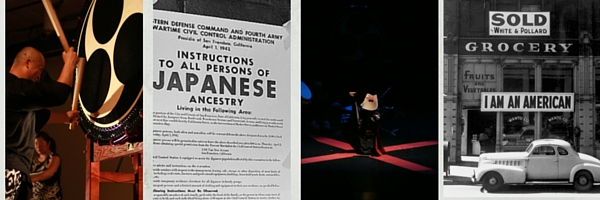
UNIT SOUZOU performs INSATIABLE
March 29, 2016 at 7:00 PM
Washington State University Vancouver
Firstenburg Student Commons
Free admission, RSVP required (limited tickets available)
Last November, President Barack Obama posthumously gave the Presidential Medal of Freedom to Hood River-born Minoru “Min” Yasui. In his remarks, President Obama described what happened on March 28, 1942:
On a Saturday night in March of 1942, Minoru Yasui left his law office to walk around Portland, Oregon. It was a seemingly ordinary act that defied the discriminatory military curfew imposed on Japanese Americans during World War II. Min took his case to the Supreme Court and lost, a decision he fought for the rest of his life. Yet despite what Japanese Americans endured — suspicion, hostility, forced removal, internment — Min never stopped believing in the promise of his country. He never stopped fighting for equality and justice for all.
Min had challenged Executive Order 9066, the forced incarceration of Japanese born Americans into concentrations camps during World War II. As a result of his action — intentionally breaking military imposed curfew to test its constitutionality – Min was jailed, fined and stripped of his citizenship. He took his fight all the way to the Supreme Court, which upheld his conviction. Eventually, the conviction was overturned. Min spent the rest of his life in Denver, continuing to fight for his own rights and for other social justice causes.
Min Yasui is the only Oregonian to ever receive the Medal of Freedom, our nation’s highest civilian honor. And to further honor Min’s significant contributions, the Oregon legislature unanimously passed House Bill 4009 designating March 28 each year Minoru Yasui Day.
This Tuesday, March 29th, WSU will be honoring the life and legacy of Minoru Yasui. UNIT SOUZOU is proud to perform INSATIABLE that evening to honor Japanese American historical roots, as well as bring a contemporary perspective on the experience.
As a 4th generation Japanese-American, UNIT SOUZOU founder Michelle Fujii’s family was greatly impacted by the history of EO 9066. All four of her grandparents were sent to the internment camps during WWII. And when Michelle began playing taiko, it sparked a desire to understand more about the internment history. Although she did not literally reference the internment experience within INSATIABLE, the tone of the work focuses on the overcoming of challenges. Michelle said, “In this work, I was not trying to recreate the Japanese aesthetic, but offer a new perspective that is grounded in my identity growing up in the United States, which is deeply informed and influenced by the internment of my grandparents during the war.”
A driving force in the INSATIABLE show is the endless repeating cycles. For Japanese Americans and contemporary immigrant social justice activists, there is palpable anxiety that the history of interment might yet be repeated. Though it can feel inescapable, Michelle hopes that Unit Souzou’s performance can offer hope. She says, “Although INSATIABLE acknowledges the overwhelming feeling, ultimately through awareness and a conscious effort, we can break the chains of repetition.”


